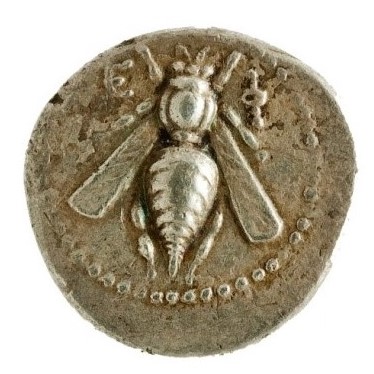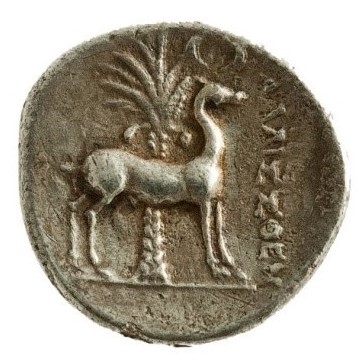Title: Drachma of Ephesos, Ionia - 1985.03
Acquisition number: 1985.03
Author or editor: Douglas Kelly
Culture or period: Hellenistic.
Date: c. 202 - 170 BC.
Material: Metal - Silver
Object type: Coins - Greek
Dimensions: 19mm (w)
Origin region or location: Türkiye
Origin city: Ephesos.
Display case or on loan: 5
Keywords: Coin, Greek, Hellenistic, Ephesos, Ionia, drachma, Artemis, Kallisthenes, Asia Minor
Sylloge Nummorum Graecorum, Copenhagen, The Royal Collection of Coins and Medals, Danish National Museum, repr. edn (West Milford, NJ, 1981-), 288 (different magistrate).
D.R. Sear, Greek Coins and their Values, vol. 1, Europe (London, Seaby, 1978), 4387 (different magistrate Sear reports more than 60).
Classical Numismatic Group Auction, 414 lot 213.
See Karwiese, Revue Epigraphique Suppl. XII (1970), 297ff.
P. Kinns, ‘The Attic Weight Drachms of Ephesus’, Numismatic Chronicle 159 (1999): 47-97 at 83, 88.
1985.03
Drachma of Ephesos, Ionia
Silver 3.90 g. 19 mm. c. 202-170 BC.
Obv.: Bee; in upper field, Ε (left) and Φ (right).
Rev.: Stag standing r. in front of palm tree; to right, reading vertically from top [Κ]ΑΛΙΣΣΘΕΝ[ΗΣ] (Kallisthenes).
The bee on the obverse of the coinage of Ephesos is found from the beginning of this city’s coinage in the early fifth century BC. The bee was the symbol of Artemis, the goddess of the wild and of wild things, whose temple at Ephesos, the Artemision, was one of the largest and most celebrated in the Greek world. The priestesses of Artemis were known as melittai,‘bees’.
On the reverse we find the name of the magistrate responsible for the issue. In this case the magistrate's name has a number of variations in legends of the period. The conclusion, however, is that the same magistrate, Kallisthenes, is referred to.
Ephesos came under Roman rule c.130 BC, which brought a change in iconography for precious metal issues.
Sylloge Nummorum Graecorum, Copenhagen, The Royal Collection of Coins and Medals, Danish National Museum, repr. edn (West Milford, NJ, 1981-), 288 (different magistrate).
D.R. Sear, Greek Coins and their Values, vol. 1, Europe (London, Seaby, 1978), 4387 (different magistrate Sear reports more than 60).
Classical Numismatic Group Auction, 414 lot 213.
See Karwiese, Revue Epigraphique Suppl. XII (1970), 297ff.
P. Kinns, ‘The Attic Weight Drachms of Ephesus’, Numismatic Chronicle 159 (1999): 47-97 at 83, 88.

